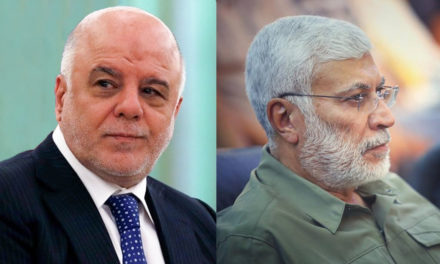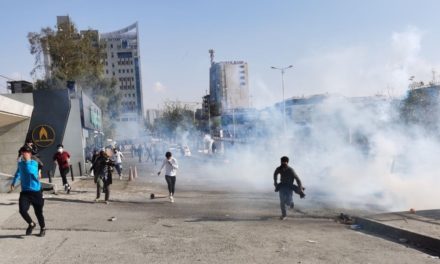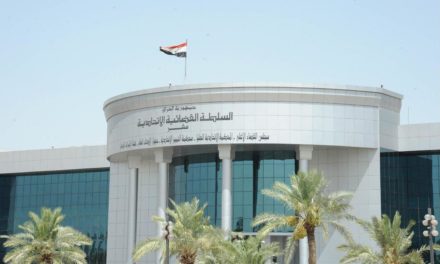Public statements by Kurdish officials consistently reveal a desire to capitalize on ISIL’s invasion of Iraq to fulfill the dream of independence.
Ever since the Kurdish Peshmerga lost the town of Sinjar to ISIL last summer, the Kurdish leadership has lamented its lack of adequate weapons to take on transnational terrorists. Appeals to the international community for substantial military aid have been framed within a narrative that the Peshmerga are the only effective force on the ground that is capable of countering the threat of ISIL.
In an interview with Eli Lake on January 30, the head of the Kurdistan Region Security Council, Masrour Barzani, complained that the supply of arms from the international coalition was wholly inadequate.
Masrour, who is President Masoud Barzani’s son, said that the Peshmerga were not receiving enough weapons to take on ISIL and criticized the size of their share of weapons coming from Baghdad.
“Now the Americans are providing 250 MRAPs to Iraq, but only 25 of them are promised to be given to the Kurds,” he said.
Masrour claimed that the Kurds were doing most of the fighting in Iraq and that their share of arms did not reflect that.
“90 percent of the burden for this war is on the shoulder of the Peshmerga, 90 percent of the work is done by the Peshmerga, but we are only getting 10 percent of the armaments.”
MIXED MESSAGES
Yet on the same day, KRG prime minister Nichervan Barzani, who is Masoud Barzani’s nephew, admitted to Reuters that his government intends to limit its fight against ISIL to areas that are part of Iraq’s disputed territories. These areas, which span four provinces outside of the KRG’s control and include the towns of Kirkuk, Tal Afar, Makhmour, Sinjar and Tuz Khurmato, have historically been highly contested by both Kurds and Arabs. The Kurds consider these territories part of a larger Kurdistan, and despite a constitutional provision to resolve the dispute, very little progress has been made since 2005.
As the Reuters report made clear, “Barzani said Kurds were fighting Islamic State for areas that rightfully belonged to the Kurdish region and would avoid using Peshmerga fighters to drive Islamic State fighters from Sunni areas or retake Mosul.”
Nichervan’s comments are diametrically opposed to his cousin Masrour’s comments from the same day. “As Kurds we don’t want to spearhead any attack to retake Mosul. We want to avoid further conflict,” Nichervan said.
CONSISTENT POLICY
Of course, Nichervan’s comments reflect an official KRG policy to avoid unnecessary confrontation with ISIL, which has remained unchanged since the fall of Mosul in June 2014. Just one week after ISIL captured the city, Nichervan told the BBC that Peshmerga forces would not help Iraq’s army retake the city of Mosul. He told the BBC that his “top priority” was to protect KRG-administered areas in the north-east of Iraq.
Nichervan’s position is also consistent with his uncle Masoud’s statements since the beginning of the crisis. Masoud Barzani views the invasion of ISIL and the collapse of four Iraqi army divisions as an opportunity to capture long-sought disputed territories.
Speaking to CNN on June 23, Masoud Barzani told Christiane Amanpour, “After the recent events in Iraq, it has been proved that the Kurdish people should seize the opportunity now – the Kurdistan people should now determine their future.”
Peshmerga forces immediately capitalized on the security vacuum and took control of the oil-rich city of Kirkuk, considered by Kurds as the “ Jerusalem” of Kurdistan. Masoud triumphantly told Amanpour, “We never had any doubt at any time that Kirkuk is part of Kurdistan.”
A week later, Masoud told the BBC that a referendum to decide on independence for the Kurdistan Region “is a question of months”.
“I have said many times that independence is a natural right of the people of Kurdistan. All these developments reaffirm that, and from now on we will not hide that the goal of Kurdistan is independence,” he declared.
To illustrate just how disinterested the Kurdish leadership was in Iraq’s broader battle with ISIL, Masoud Barzani told Peshmerga forces during a visit to Kirkuk on July 29 that “final victory is near”.
THE SINJAR SETBACK
But by August 3, Barzani’s tone had shifted dramatically after ISIL advanced into and captured Kurdish-controlled Sinjar, leaving Peshmerga forces fleeing to Erbil without putting up a fight.
The defeat in Sinjar left tens of thousands of local Yezidis at the mercy of ISIL. It was also a huge blow to the legendary reputation of the Peshmerga and Barzani’s goal of achieving “final victory” and holding a referendum on independence. The Kurds played down claims that the defeat was due to inherent corruption and mismanagement within the Pershmerga (an accusation that was leveled at the Iraqi army by Kurdish officials), and instead insisted that their forces were inadequately equipped to fight back against ISIL.
Queue a concerted pubic relations effort to appeal to the international community for arms, justified on the basis that the Peshmerga were the only effective force that could confront ISIL. Fast-forward to Masrour and Nichervan’s comments last month and it is clear that appeals for more arms have little to do with defeating ISIL altogether, and more to do with realizing their dream of an independent Kurdistan.
THE CURRENT STATE OF PLAY
Masrour’s claim that the Kurds had only received four shipments of munitions in recent months was disputed by a State Department official who asserted:
“Baghdad had recently sent 25 MRAPs to the Kurds, and that since August there have been 59 international cargo flights worth of ammunition delivered to the Peshmerga. This included 45,000 mortar rounds, 2,800 rocket-propelled-grenade launchers, 40,000 rounds for those launchers, and 18,000 assault rifles.”
The arms transfers to the Kurdistan Region include substantial shipments from the German government, which decided on 31 August to provide 3 tranches of lethal and non-lethal military equipment to the Peshmerga.

The transfer, which was approved by Baghdad, includes “assault rifles, machine guns, pistols, anti-tank weapons, and hand grenades, as well as helmets, body armor, ballistic safety glasses, night-vision devices, mine-detection systems, and radios,” in addition to trucks and utility vehicles.
Most recently, Italy has supplied the KRG with small arms, anti-tank ammunition and systems, Browning machine guns, Mg 42/59 machine guns and other equipment.
IRANIAN ASSISTANCE
The KRG has not only acquired arms from the US and European allies, but most notably, Iran has supplied weapons and ammunition to Kurdish forces. In a joint press conference on August 27 with Iranian foreign minister Javad Zarif, Masoud Barzani admitted, “We asked for weapons and Iran was the first country to provide us with weapons and ammunition”.
A Peshmerga commander, speaking to BBC Newsnight in September, also admitted to having received military hardware from Iran:
“They sent 16 truckloads of weapons, they sent big artillery, they sent monitors, two big rocket launchers, 3 or 4 smaller ones; they sent a mortar battalion too.”
Of course Kurdish officials are no strangers to acquiring arms. After the collapse of Saddam’s regime in 2003, the Kurdish Pershmerga from both the KDP and PUK commandeered more than150 Soviet-made T-62 tanks from the Iraqi army.
It was not the first time that the Kurds had got their hands on military hardware belonging to Saddam’s regime. During the Kurdish civil war in the mid-1990s, Masoud Barzani’s KDP notoriously invited Saddam’s Republican Guards and 30,000 Iraqi troops to help crush his Kurdish rival Jalal Talabani and the PUK.
Talabani, who went on to become Iraq’s president, in turn accused Barzani of receiving armored cars from Saddam, while the KDP’s Hoshyar Zebari, who would later serve as Iraq’s foreign minister, claimed that the PUK was “backed by howitzers and Katyusha rocket- launchers provided by Iran”.
SECRET ARMS DEALS
In November 2008, the Washington Post cited three unnamed US military officials who claimed that the Kurds had secretly taken delivery of three planeloads of small arms and ammunition imported from Bulgaria, without the knowledge of Baghdad’s central government.
Meanwhile, in July 2012, a high-ranking Iraqi official said that security agencies had obtained documents that uncovered a secret weapons deal between Masoud Barzani and an unnamed foreign country.
“The weapons include anti-armor and anti-aircraft missiles, and a large number of heavy weapons,” the official said.
“IF YOU DON’T HELP US, WE WILL DO SOMETHING”
While the United States and Europe may be fully aware of Masoud Barzani’s stockpile of arms, it seems that Western allies will continue to meet his demands for one simple reason: they know that Barzani is willing to do whatever it takes to get his way. Prior to inviting Saddam’s Republican Guards to execute hundreds of Kurdish PUK fighters in Erbil, Barzani was asked whether he considered Saddam a friend or enemy:
“He was our enemy but now I cannot say he is our enemy, if he be ready to solve our problem.”
In an effort to deny Iran the opportunity to “solve” Barzani’s problems, Western allies will continue to meet the demands of lamenting Kurdish officials, despite the inevitable cost of facilitating Kurdish ambitions in the disputed territories. If they do not heed his calls, it is likely that these old sentiments will take on a new form:
“Then we asked the United States: if you don’t help us, if you don’t protect us, we will do something. We will ask the help from everybody, even from the Iraqi army. I don’t know, they didn’t understand, or they didn’t like to understand.”

Ali Hadi Al-Musawi
Ali Hadi Al-Musawi is an Iraqi analyst and contributing writer at 1001 Iraqi Thoughts.










